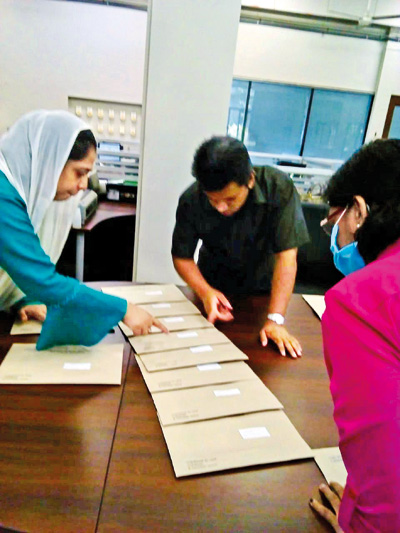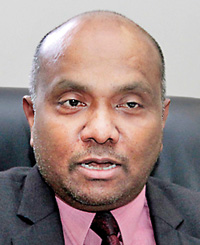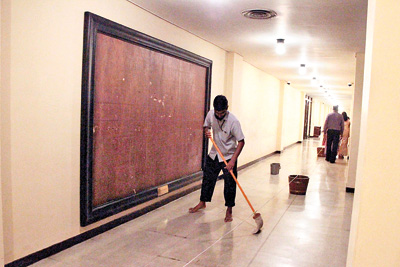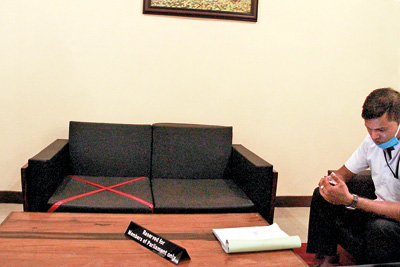News
Ubiquitous pandemic guidelines will greet MPs, visitors as new Parliament meets
Next Thursday’s (August 20) inaugural session of the Ninth Parliament will be unlike any other in history as it will sit in the midst of the yet to be eradicated COVID-19 pandemic.

Are the invitations all in order? Pix by Indika Handuwala
The inaugural session and subsequent sessions when proper business of the House begins, pose a host of extraordinary challenges to both MPs and the Parliament staff as they have to work under Health Ministry guidelines specifically prepared for them.
The guidelines cover all areas of Parliament, including the gallery, chamber, restaurants and committee rooms, Parliament’s Serjeant-at-Arms Narendra Fernando told the Sunday Times when we met him on Friday. Since the guidelines were handed over last month, action has been taken to enforce them as far as the Parliament complex and its staff are concerned, he said. The entire complex was sanitised under supervision of the health authorities while all restaurants in the complex now operate as per the guidelines. Health authorities even checked the complex and surroundings for dengue breeding sites and certified it as “dengue free.”
The guidelines require that the entire Parliament Chamber and lobby areas be cleaned and sanitised every day before Parliament sessions begin. All microphones, tables and chairs where MPs sit will be sanitised. “The entire operation presents an enormous challenge to our Housekeeping Department,” Mr Fernando said, adding that he hoped MPs would cooperate with the staff in ensuring that the guidelines were adhered to.
While Parliament staff are now adhering to the guidelines, Mr Fernando said they were still in the process of educating the newly elected MPs on what they should expect at the inaugural session and thereafter. “We will have to enforce the guidelines until the health authorities tell us there is no longer a need to do so,” he pointed out.
Under the guidelines, MPs must allow Parliament staff to check their temperature whenever they enter the Parliament complex. They must wear face masks at all times unless when taking meals. Even when they make a speech in the House, they cannot take the mask off.
There will be no seats reserved for MPs at the inaugural session as under Standing Orders, a Speaker has to be appointed beore seating arrangements are worked out.
Between 30-35 MPs on the government side will still have to take their seats in the opposition benches. With the Government having secured 145 seats and with another five or six MPs from parties supporting it, there is simply not enough room on the government side to accommodate all its MPs.
Once seating arrangements are finalised, MPs will have to remain in their assigned seat at all times and cannot sit in the chairs of others.

Parliament’s Serjeant-at-Arms Narendra Fernando
The guidelines also stipulate that whenever an MP is not in the seat, they must try to maintain a one-metre distance from each other. “There is no one-metre distance between MPs’ chairs in the chamber. The distance between seats is only about two-and-a-half feet. That might be the reason why the health officials have instructed members to keep the face mask on even when speaking,” Mr Fernando observed.
MPs have been asked not to shake hands or hug one another and to practise non-touch greetings. Members will also be asked to use their personal equipment such as laptops, tabs and mobile phones as much as possible and to avoid using common equipment. If compelled to use a common laptop, MPs are adivsed to sanitise their hands before and after using the equipment.
In the end, it will still be up to MPs to adhere to the guidelines, the Serjeant-at-Arms noted. “We don’t know if all of them will adhere to the guidelines and we can only force them to follow the guidelines to a certain extent. But, it is for their own safety and we hope they will abide by them.”
As far as the agenda for the inaugural session is concerned, Parliament will convene at 9.30am on Thursday where the Speaker, Deputy Speaker and Deputy Chairperson of Committees will be elected. Afterwards, all MPs will take their official oaths. The Speaker will then adjourn Parliament until 3 pm, when a ceremonial meeting will take place with President Gotabaya Rajapaksa delivering the new Government’s Policy Statement to Parliament. Parliament will be adjourned thereafter.
There are 674 seats in the Parliament gallery. Given that the guidelines stipulate that there must be one-metre distance between those in the gallery, Parliament will limit the number of persons to 300. This means that only one pass will be issued for a family member or friend of an MP to watch the proceedings from the gallery. They too will have to provide details such as their full name and National Identity Card number to help in contact tracing in the event of a health emergency.
There will be no invitees for the inaugural session in the morning as it is taken as just another Parliament session. There will be invitees for the ceremonial meeting in the afternoon. Normally, about 600 individuals in the State’s “Order of Precedence” are invited to such a meeting. Given the guidelines in place, this too will have to be restricted to 300, Mr Fernando revealed.
Presidential visit devoid of ceremonies
Next Thursday’s inaugural session of the new Parliament will be a scaled-down affair largely devoid of the pomp and pageantry associated with such a grand event.
Thursday’s sitting of the new Parliament will have two distinct aspects: The inaugural session of Parliament at 9.30am and the ceremonial sitting at 3 pm with President Gotabaya Rajapaksa delivering the new government’s policy statement.
The President has informed Parliament not to have the traditional guard of honour and 21 gun salute accorded to the Head of State, Parliament’s Serjeant-at-Arms Narendra Fernando told the Sunday Times. The President will also dispense with the ceremonial motorcade used for such occasions and simply arrive in his normal motorcade.
Moving forward after August 20, Parliament will have to consider whether it will amend existing Standing Orders, at least temporarily, to allow for committee meetings to be held virtually. Such meetings have already been trialed successfully by Parliament staff, but it will be up to the Committee on Parliamentary Business, representing all parties in Parliament, to decide on the matter once it is constituted.
Meanwhile, the Serjeant-at-Arms said the ban on visitors, including groups of school students, would continue until the health authorities inform Parliament that it was safe to allow them.

A clean-up before the big day

Kepp your social distance: A chair in the vicinity of the Serjeant-at-Arms office

